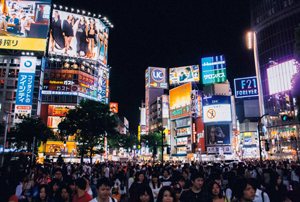 The Nikkei Marketing Journal (9 May) has reported the results of an Internet survey regarding “economic activities at night”, defined as the hours between sundown and sunrise.
The Nikkei Marketing Journal (9 May) has reported the results of an Internet survey regarding “economic activities at night”, defined as the hours between sundown and sunrise.
The survey, conducted by Macromill Inc., a leading marketing research company in Japan, received valid replies from 1,000 men and women between the ages of 20 and 59 residing in Tokyo’s 23 wards. In addition to frequency and amount of outlays, the questions also differentiated between personal out-of-pocket expenditures as opposed to business-related entertainment.
Going out “almost every evening” (6%) and “once a week”, together accounted for a total of 41% of the answers.
The largest segment of respondents (30%) said they spend ¥3,000–5,000 per month, with two thirds of respondents spending less than ¥10,000 per month. On average, the respondents’ outlay comes to ¥14,519, with 6% saying their monthly spending exceeds ¥50,000.
In reply to a question about whether they agreed that the service and infrastructure for night business in Tokyo should be increased, 26% of respondents answered in the affirmative, and 27% in the negative. The remaining 47% were noncommittal.
Rather than thinking about night-time entertainment, however, 67% of the respondents stated their desire that night-time service be available at hospitals, 61% that trains run all night and 47% that more supermarkets be open all night. Of all those surveyed, 72% said they did not expect any major changes.
A sidebar to the article adds that, to promote the night-time economy, more efforts are being directed to attracting overseas visitors by such means as the Shibuya Night Tour, which commenced in April. After a group photo is taken at Shibuya’s famous scramble intersection, the tour makes its way along Dogenzaka and through Maruyama-cho, where participants are invited to partake of takoyaki (balls of minced octopus) and eat sushi standing up at a counter. The cost for the two-hour tour is ¥3,000 (extra for the food and drink consumed). On a different tack, by 2020 the Tokyo metropolis plans to have night illuminations in 58 city locations—about double the current number.